#toh meta
Text
It always surprises me how expressive Hunter is, given the way he was raised. He was a soldier after all, a weapon, Belos' right hand man.
And then I remember that he used to wear a mask all the time. He wouldn't have had to control his expressions at all.
So without it? He really wears his feelings on his sleeve. Something that could have been easily exploited in the Emperor's Coven and probably was.
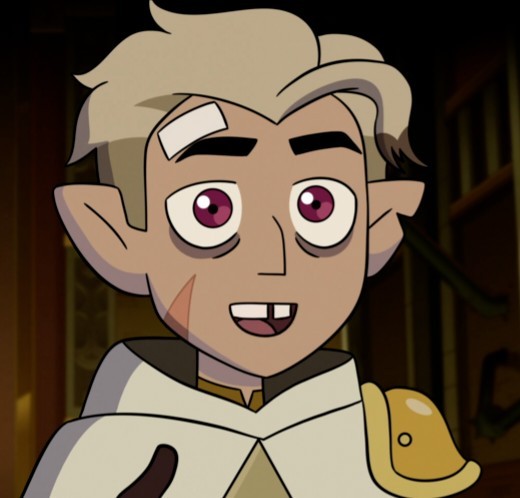
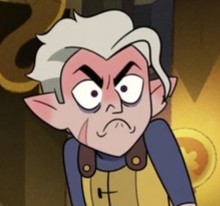
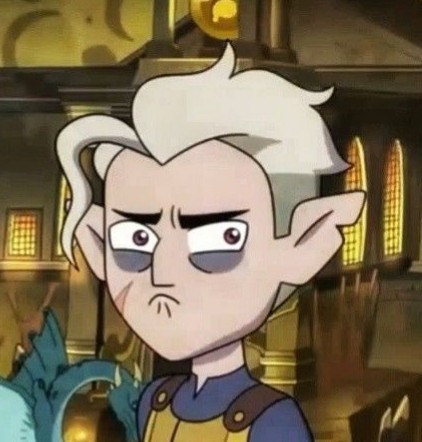
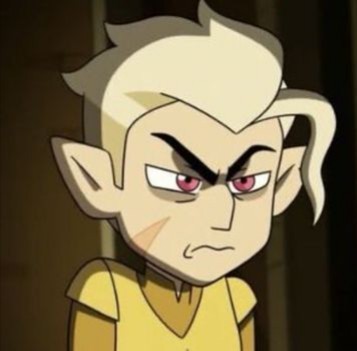
18K notes
·
View notes
Text
There is a lot of craziness that’s been going on at The Boiling Isles. But at least we know now that King still had his mom through it all.
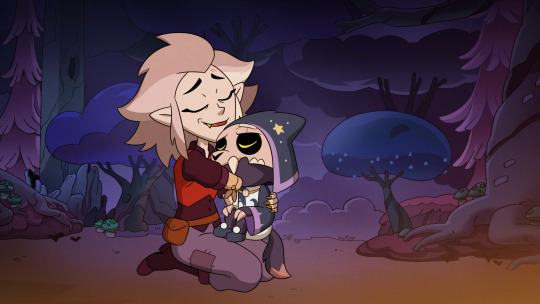
#the owl house#toh#toh spoilers#the owl house spoilers#eda clawthorne#mama eda#eda the owl mom#eda the owl lady#king clawthorne#for the future#season 3#s3#meta#toh meta#the owl house meta#my own meta
4K notes
·
View notes
Text
I’ve seen people talk about the main theme of the owl house being acceptance, and I think they’re completely right about that. But I haven’t really seen anyone look at the sub themes depicted in the show around the acceptance theme.
Specifically how the owl house is really advocating for child autonomy. Specifically in the ways of discipline, showing that communicating and talking with children ends up being a lot more beneficial and effective than punishing them.
The most obvious example comes with the collector, where instead of talking to him, King’s dad punished the kid by putting him in essentially time out, for the actions of his siblings. Which he would’ve learned if he had talked to the collector. And then following that, every interaction before talking with Luz, has the collector being used or placated in some way instead of being treated like an actual child due to the amount of power he has. The titan trappers revering him as some sort of god, Belos manipulating him, and even king attempting to appease the collector, instead of really talking to him. Though for king it’s a bit more understandable. Even so, the show showcases the collector’s change only after he’s talked to like a person, and then shown why his views were wrong.
Luz, who’s the main focus of the show, has her character arc and journey centered around being punished for her not fitting in at school. And while, yes, some of Luz’s antics that were shown seemed to be legitimately dangerous, the real solution would’ve been to talk with her and teach her about safety and why bringing wild animals and fireworks into a school building is dangerous. It should have also been that Luz should be able to talk and negotiate with her teacher about what would be acceptable for her projects with her endless creativity. The solution was not to essentially punish Luz for being creative, and what that only did was make her feel worse about herself and more isolated from the people she thought would be on her side. And then we were shown in thanks to them and for the future, Camilla’s growth into understanding that not talking to Luz about this, and essentially forcing her into normality, was not the way to go about things.
And we see this theme again, with Willow forced into the abomination track because her parent’s thought that was what was best for her, until she was able to showcase her skills and switch to what she was actually good at. Alador realizing he missed a lot of Amity’s growth by not talking to her, and then making it up to Amity by letting her set the boundaries and reestablishing their relationship. Odalia being controlling and not listening to her children which lead to actively harming their social development, until she was confronted and then shut out. Belos manipulating Hunter, isolating him, and abusing him, not even listening to what he had to say. And all of these situations were made better and more bearable when they were given the chance to take charge and be heard.
All this, in an attempt to showcase that children can be vulnerable and malleable, but they are also smart and understanding. And instead of deciding what a child needs, it’s important to communicate with the child instead, asking what they need and listening to what they’re saying. And implementing that by guiding and supporting them, not attempting to control them to what someone else thinks is right.
Children are smart and observant, they just need to be taught how to communicate, and viewed and thought of as actual human beings.
In a way, the owl house is attempting to advocate for it’s audience, and that’s beautiful.
#the owl house#toh#toh spoilers#toh season finale#luz nozeda#toh hunter#willow park#amity blight#child autonomy#honestly i think it's a really important thing to be taught to everyone at every age#Children are seen as dumb and it's disheartening because they're not#they're open to new ideas and possibilities and not yet stifled by their own learned w-orld veiw#and they don't know everything so that's why they need to be taught#refusing to teach them ultimately takes away any chance of growth#no kid is a lost cause#and kids can understand when something is wrong#ignoring them looses the chance for the kid to learn how to understand and indepen-dently come up with a solution later#toh meta
2K notes
·
View notes
Text
The Owl House And Restorative Justice
At the end of Season 1 of The Owl House, it is revealed that Lilith, the main overarching antagonist of that season, was the one to curse her sister Eda, one of the protagonists, to win a tournament when they were teenagers. This information causes Eda to fly into a screaming rage and attack Lilith, and understandably so.
Eda’s curse is essentially a chronic illness, one that, in Eda’s own words, has ruined her life, being the reason she’s considered a social outcast and why, before meeting King and Luz, she hadn’t gotten close to anyone in years. In season 2, it’s revealed that the curse is why she pushed away her partner Raine to the point that they broke it off with her, and that during a particularly bad flareup, she accidentally maimed her own father, leaving him half blind and with permanent nerve damage to his hands, making him unable to continue working as a Palisman carver. The curse has ruled Eda’s life for decades now, so to Eda, this is the ultimate betrayal.
In the first episode of Season 2, Lilith has defected from the Emperor’s Coven, split the curse between Eda and herself to mitigate the symptoms for her sister, and has moved in with Eda at the Owl House. While Lilith herself still feels guilty and feels she has to make it up to Eda, everyone else, Eda included, has seemingly either forgiven her or chosen to look past it. Eda even makes fun of her for feeling bad about cursing her, and Lilith’s guilt is seemingly absent for the rest of the series.
The response to this was… Less than stellar, shall we say. A lot of people were angry, saying Lilith got away with her crimes without even a slap on the wrist, and that Eda’s forgiveness of her was far too sudden.
This isn’t the first time we’ve seen this kind of critique. Amity spent years bullying Willow after her parents forced her to break off their friendship, and when she began trying to mend that relationship, the response from fans was that Willow should have been a lot more angry at Amity, and that they went back to being besties far too soon. I’ve even seen this criticism leveled at Hunter for the things he did while working for Belos, at Vee for impersonating Luz for months to trick her mother, and at Luz for hiding the fact that she helped Philip find the Collector from her friends. And it does seem strange for the show to keep tripping on this same point again and again.
Except, it’s not really. Because I think that, when viewing this show from a different angle, those supposed flaws are actually symptoms of something very important to understand – The Owl House operates on a system of crime and punishment that is very different from our world’s.
More specifically, our world mostly utilizes retributive justice. The world of The Owl House utilizes restorative justice.
So first, what do those terms mean? Broadly, they’re two different forms of handling interpersonal disputes, or dealing with crime.
Retributive justice is the one our current justice system uses, where the focus is primarily on punishing the perpetrator. Retributive justice can mean detention, suspension, expulsion, jail time, monetary fines, some kinds of community service, exile, or in more severe cases, corporal punishment or the death penalty. It’s the lens most people view the world through, where if someone hurts you, hurting them back is the correct response.
Restorative justice is a very different approach, where you instead focus on helping the victim recover from what happened, and rehabilitating the perpetrator to prevent this from happening again. Restorative justice can look like verbal or written apologies, monetary compensation for costs and trauma, therapy for both victim and perpetrator, education for the perpetrator, mediation between victim and perpetrator, a restraining order, etc.
When viewed through a retributive lens, The Owl House lets its characters get away with a lot of shit. Lilith cursing Eda, Hunter rounding up Palismen knowing they’ll be killed, Amity tormenting Willow for years, it’s all stuff that, in a retributive environment, they should be punished for, and they’re just not. Eda is only genuinely angry at Lilith for two scenes, Amity and Willow fix their relationship very quickly once Amity starts making amends, and Hunter isn’t punished at all.
However, I believe the story of The Owl House is best viewed not through a retributive lens, but through a restorative lens.
Let’s look at the Lilith-example again. Lilith’s offense was cursing Eda, which she did because she wanted to win a spot in the Emperor’s Coven. Knowing Eda was better than her, she cast a curse on her, thinking it would only last for a day. But when the time came, Eda forfeited the match, soon after which she transformed into the Owl Beast and was pelted with rocks until she ran. The curse turned out to be very permanent, and Lilith spent the next 20 years trying to fix her mistake by working for Belos to try to capture Eda, since he promised to heal her curse.
However, when she finally succeeded, Belos went back on his promise. Instead of healing Eda, he ordered her to be publicly executed. When Lilith protested, Belos essentially told her to shut up, that it was the Titan’s will, and left her there.
So, having realized her method of fixing her mistake has gone real bad, Lilith sneaks down to the Conformatorium to free Eda herself, but arrives too late and finds Luz instead. After a brief fight they end up teaming up, and Lilith leads Luz to the elevator, but they are captured by Belos and Lilith is thrown into the cage with Eda. There, she restores Eda’s partially petrified body, and after fleeing with her, Luz and King, uses a spell to split Eda’s curse evenly between their two bodies.
From a restorative justice point of view, Lilith has done pretty much everything she reasonably could do to fix things. She’s denounced the Emperor’s Coven, returned Owlbert to Luz, helped Luz find the elevator to the execution platform, saved Eda from petrification, apologized to Eda, and while there’s no way for her to cure Eda’s curse entirely, she took on half of the curse at great expense to her own health, in order to ease Eda’s symptoms.
Eda isn’t angry anymore because in her eyes, Lilith has already fixed things with her. Punishing her more at this point is pointless. What more could Lilith do, really? What other lessons could she learn? The only thing that punishment would bring at this point would be more suffering.
Let’s look at another example: Amity and Willow.
Amity’s offense was breaking off her friendship with Willow because she was a late-bloomer, bullying her for years, and allowing her friends to do so too. Willow is left with horrible self-esteem issues because of this, and combined with her failing grades, turned her into a horribly shy and withdrawn wallflower (no pun intended). After she’s moved to the plant track she starts actually getting better, but Amity and Boscha especially continue to torment her. While Amity’s bullying of Willow does peter out over time, Willow is clearly still extremely resentful of her. In an attempt to make Willow forget their friendship, Amity accidentally sets most of Willow’s memories on fire, leaving her confused, amnesiac, and unable to grasp basic concepts like that chairs are for sitting in.
Luz pushed Amity into fixing Willow’s brain by going into her mind together and piecing her memories back together. There, the Inner Willow revealed what happened to Luz and the audience.
At this point, Amity shows her that her parents were actually the ones who forced her to end the friendship because they didn’t think Willow was a suitably powerful or influential friend, threatening to make sure Willow would never get accepted into Hexside if Amity didn’t force her to leave. Amity then apologizes to Willow for going along with it, and for the bullying, and vows to make sure her friends never mess with Willow again.
Willow accepts her apology, but also makes it clear that, while it’s a start, she’s not yet ready to accept Amity in her life again. Restorative justice has not been fully attained, because to Willow, Amity hasn’t fixed everything – Boscha and her squad are still bullying her, and still consider Amity one of them. This changes two episodes later, when Amity tells Boscha to grow the fuck up when she starts bullying Willow again, and joins her and Luz’s Grudgby team despite her personal issues to get Boscha to back off. Willow doesn’t make a grand gesture of forgiveness in this episode, but it is after this point where the two become comfortable around eachother again.
Did Willow forgive Amity too quickly for years of trauma? Maybe. If she had chosen to continue keeping Amity at a distance I certainly wouldn’t have blamed her. But in the end, Amity fixed the mess she caused as best she could, and has proven herself to want to be a better person, to want to be Willow’s friend again. She worked hard to prove herself to be a person worth trusting, and Willow decided to give that trust a chance again.
And while they did become friends again, that friendship was clearly still affected by what happened, which led to bumps that the two of them had to work through. Like in Labyrinth Runners, where Amity’s overprotectiveness over Willow makes Willow feel like Amity thinks she’s incompetent, and still only sees her as the helpless person she used to be.
Willow continuing to be mad at Amity and punishing her for what she did wouldn’t be an unreasonable reaction, but it wouldn’t have fixed anything. It would certainly have an impact on Amity, seeing her former best friend rejecting her attempts to make up for what she did, but the hurt on both sides would have continued festering, because deep down, Willow missed Amity too.
In Hunter’s case, there’s the question of whether he can even be held responsible for his actions. The Palisman-kidnapping in specific was explicitly done under duress – if he failed he would face verbal and physical abuse, and be threatened with his nightmare scenario: getting thrown out of the Emperor’s Coven.
And that’s not an empty threat either. Hunter has no magic, and Belos has drilled it into him that witches without magic have no future. Without the Emperor’s Coven, his only future prospects would be starving to death on the streets or wasting away in prison. Either way, Hunter would be alone, without family or friends, without a job or job prospects, without anyone to turn to for help. Any child would be terrified of that. Hunter wasn’t always acting on direct orders – in fact he defied direct orders to stay in his room in Eclipse Lake to go look for Titan’s Blood, and then again in Hollow Mind to arrest the rebels. But he made those choices based on the idea that Belos wouldn’t want him if he was a failure, and that he needed a chance to prove that he could still be useful.
And contrary to popular belief, Hunter does know right from wrong. He has a very strong moral compass, he’s just been forced to ignore it in favor of doing whatever the Emperor wants. To shut up that little voice telling him he’s doing the wrong thing, he uses what’s called a thought-terminating cliche, a statement that feels so fundamentally true that the argument need not continue. In Hunter’s case, that statement is “It’s for the greater good.” Sure, kidnapping his new friends and abducting Palismen to feed to the Emperor and threatening someone who’s been nothing but kind to him to take the portal key from her girlfriend and justifying terrorism makes his stomach feel like he swallowed a cactus and saying it out loud makes him sound like a horrible person – but it’s for the greater good. He’s doing it to serve Belos, and Belos knows what’s best.
So by the time Hunter is out of active danger and able to rest and recover from what happened to him… what would further punishment accomplish? He already knows that he did fucked up shit while working for the EC, and he’s proven time and time again that while he’s not fighting for Belos’s approval, he’s actually a genuinely kind-hearted kid. Punishing him now would likely cause him to react very poorly, because he’s been at the wrong end of that stick so often that he’s developed severe PTSD because of it.
And if you think restorative justice is still in order – Hunter is currently hyperfixated on making sure Belos can never hurt anyone again, and for the long term, he has expressed that he wants to become a Palisman carver when he grows up. While it won’t bring back the Palismen that were killed, it will help the current Palisman population recover and reintroduce Palismen to witches who may have had to give up theirs.
When viewed through this lens, the writing of The Owl House starts to make more sense. As a show, it is extremely forgiving towards its characters – they’re still held accountable for their actions, but as long as they’re willing to grow and learn and fix the damage they caused, they are very quickly forgiven.
However, I do understand why these writing choices can be… controversial, so to say. Because it doesn’t feel very satisfying, does it? When someone hurts you on purpose, your first impulse would be to try to hurt them back, that’s just how people work.
That’s the hardest thing to come to terms with when you become an advocate for prison abolition for example – you’re not just arguing for freeing a guy who got 5 years because a cop found weed in his pockets, you’re arguing for the release, and most importantly, the humanity of some of the most vile, disgusting people this planet has ever produced. Even now, when someone commits a truly awful crime and gets sent to prison for life, my first thought is “Good, I hope they rot in there.” But that’s not justice. That’s just revenge. And revenge is not something we as a society should want to build our justice system on.
It’s not satisfying to see Lilith go from using Luz as a human shield in her fight against Eda to sleeping on the couch in Eda’s house within 2 episodes. It’s not satisfying to see Willow let Amity back into her life when Amity has hurt her so badly before, or to see Hunter become romantically involved with Willow after he literally abducted her the first time they met. But that satisfaction isn’t really the point. Revenge is satisfying in the moment, but an eye for an eye makes the whole world blind, and if someone shows a genuine willingness to change, it’s often better to give them a chance to.
However, my final point is about what happens when this approach fails. Because not everyone is willing to change. Some people, when faced with the consequences of their actions, decide to dig their heels in and refuse to admit fault, or blame the victim(s), or use those same thought-terminating cliches that Hunter used to justify their actions, “I was just following orders” being a big one.
And thus, we come to Belos.
If Belos showed a willingness to change, a genuine one, not an attempt at manipulation, should he be given the chance to? That vengeful part of me is VERY empathetically saying no. But logically, reasonably, he should be given that chance, if only because he’s a human being and no human being deserves to be mistreated. That doesn’t mean his victims are obligated to forgive him or be around him again, in fact I think that, for the sake of Hunter’s mental health, Belos should stay as far away from him as humanly possible. But he should be given the chance to start over, to truly better himself and do something good with the rest of his life.
But Belos isn’t willing to change.
Belos is a product of a bad environment and grew up with a cult-like mentality and hatred for witches that he had to adopt for his own safety. It’s hard to break out of that mentality, but not impossible. Case in point: Caleb. The tragedy of Belos’s character to me is that he had so many chances to change, so many people to help him make that leap, but all of the people who offered him that help ended up dead by his hands because he couldn’t handle the idea that he may have been wrong.
At this point, Belos is stuck. Changing would mean not only giving up on his life’s work, but acknowledging to himself that everything he’s done, mutilating his body, killing his brother, slaughtering thousands and installing himself as God-Emperor of a population he despises more than anything in order to facilitate a genocide, was completely pointless.
He can’t admit that to himself. Especially the thing about Caleb’s death. He’s sunk-cost-fallacied himself so far into a corner that all he can really do when faced with opposing viewpoints is dig his heels in even deeper and lash out in a rage at anyone who challenges him. Even now, when his body is literally falling apart at the seams, he’s still trying to commit witch-genocide, because it’s all he has.
Restorative justice doesn’t work in this case, because the perpetrator needs to be receptive to it. Logically you would assume the show would default to retributive justice, and characters like Willow and Camila do take a very vengeful glee in imagining themselves beating the snot out of Belos. But right now, the primary motivation of the Hexsquad and Hunter in particular when it comes to Belos is to end the threat he poses. As long as Belos is alive and free, he will continue to hurt and kill people, and if he can’t be talked down, he needs to be either contained or killed to prevent him from causing more harm.
The Owl House provides, in my opinion, a very nuanced take on restorative justice. It shows how it works in action, how different situations impact what it looks like, and what happens when it’s simply not an option. It’s not the most satisfying story to tell your audience, because when someone hurts our babies we want them to suffer, no matter how sorry they say they are. But in this case, I think that sacrificing that bit of audience comfort is worth it to tell the story like this.
3K notes
·
View notes
Text
there's such an interesting extra layer to amity and her relationships (especially w luz) that gets revealed when you learn that not only is she an abuse victim herself, but she is also the child of an abusive marriage
like not only was she personally abused/neglected and taught that she doesn't deserve to have her boundaries respected and won't get positive attention unless maybe she "earns it" by being useful and overachieving, but also her main example of a romantic partnership involved one partner exploiting the other and treating him as an expendable tool
in all of her relationships (platonic, romantic, familial), amity learns to give and receive kindness, learns to respect and set boundaries, learns that the value of herself and others aren't dictated by achievements or usefulness. she's breaking the toxic patterns that her parents taught her via their treatment of her.
but with her romantic relationship with luz, not only is she learning all of the above, but she's also breaking the toxic patterns of a romantic relationship that she would have learned from watching her parents.
when she shows kindness to luz, loves luz wholeheartedly even when she makes mistakes or causes problems, respects luz's privacy and boundaries, she is treating her girlfriend in a way that opposes the way her mother treated her own husband.
when she learns that she doesn't need to be useful or else risk abandonment/punishment, she's learning that she shouldn't accept or expect to be treated by her girlfriend the same way that her father was treated by his own wife.
i just. i love stories about characters breaking cycles. and i love luz and amity's relationship so much. it's very much not the kind of relationship i'm invested in the same way i am invested in with ships between adults. but rather like, it's a relationship between these two young people who are learning to healthily navigate this kind of relationship for the first time in their lives and it's really sweet.
#eliot posts#toh#the owl house#amity blight#abuse mention#toh meta#ive probably talked abt this a bit before but. god. i love it so much.#i LOVE stories about characters breaking cycles they drive me buckwild#lumity#if there's any good character study fics abt amity being the child of abuse and breaking that cycle... send em my way
462 notes
·
View notes
Text


[ID identical to alt text: two screenshots from The Owl House finale. The first is the Titan telling Luz: "I am both king and queen, best of both things!"
The second screenshot is Luz reacting with a warm, slightly awestruck smile. End description.]
it could just be part of her generally awed demeanor in this scene (because, like, who wouldn't be awed about meeting the Titan?), but I'm really soft over the look in Luz's eyes when her little brother's dad eschews gender norms.
because this Luz, who's bi, who doesn't want to choose between literal worlds, and who doesn't want to choose between feminine and masculine gender presentation. who's textually gender non-conforming, and incredibly easy to interpret as genderqueer, multigender, nonbinary, or any combination of those and more.
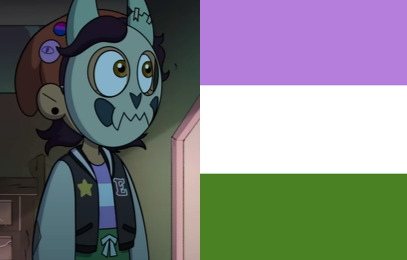
[ID identical to alt: a screenshot of Luz in a t-shirt with purple and white stripes, along with green sweatpants. It evokes the genderqueer flag, which is displayed next to her. End description.]
in the narrative, queerness is taken so in stride that Luz never even seems surprised by how normalized it is in the Boiling Isles — and from the start, she isn't afraid to show her own bisexuality either, which I think speaks volumes to how Camila must've raised her in a very accepting environment. but still, there's something to be said about how special it must be for Luz to meet the Titan —
who is King's dad, who is the source of all her magic, who the literal ground she's been walking upon —
and for Luz to realize: "oh, him? the closest thing to a deity of this world? she's actually a lot like me."
#the owl house#luz noceda#papa titan#the owl house meta#toh meta#folks i rewatched the finale the other day and i am NOT normal about it#the entirety of luz and the titan's relationship just makes me want to lie on the floor bawling (/positive)
782 notes
·
View notes
Text
Forgiveness and kindness in the finale of Owl House
One of the things I loved about the finale was showing that forgiveness and kindness are good things, that they can change people for better and that keeping an open hand for somebody to grab on is a beautiful and sometimes very healing thing. That it can change so much to just keep an open heart and try giving people another chance. Try forgiving them.
Like Luz and Eda and King did with Collector. They choose to be kind to them, to reach out and to try showing them a better way even when they didn’t need to. When they had every reason to be mad at him. And it changed everything for the Collector, who was hurt so much by everybody in their life, who didn’t understand the reality of his actions. It made all the difference in the world for him that somebody was willing to listen. To try forgiving and offering kindness even thought they did so much damage to everyone.
But.
They also showed the reality of it. That sometimes it just doesn’t work. Sometimes the person that we turn our kindness and our forgiveness towards isn’t willing to accept it and isn’t willing to work to better themselves. Isn’t willing to look at themselves and realize that what they’re doing is wrong. That they made a mistake. That they hurt others. They aren’t willing to work towards the better future.
Just like Belos.
Belos who refused to change. Belos, who looked at the kid he used and discarded, who was now offering him a hand in forgiveness, offering him kindness he was just taught to give and decided to not give a fuck about it. Who decided to take that kindness and destroy it. Belos, who to the bitter end was unwilling to look at himself and see what sort of person, what sort of monster he became. Belos, who refused the hand reaching out to him again and again.
And thats the beautiful and painful reality of forgiveness and kindness. It doesn’t work every time. Sometimes it backfires, like it did when Collector offered it to Belos. Sometimes it gets you or people you care about hurt. Like it did with Luz. And for it to work the person on the receiving end has to be willing to accept it. To work towards the betterment, towards being a better person, towards not making the same mistakes.
Sometimes when you give a chance to people, they will disappoint you. They will take your kindness and throw it back at your face. But does this mean we shouldn’t offer second chances to people? Does it mean that we shouldn’t forgive or be kind?
No.
Because there is always a chance that it can save people, just like it did with Collector, just like it did with so many characters in the series like Amity, Lilith or even Hunter. Because there is just as many people who will take the hand you offered and it will mean the world to them. It will change everything for them.
And I think thats beautiful.
#owl house#the owl house#owl house spoilers#toh belos#toh collector#the collector#owl house collector#owl house the collector#owl house belos#the owl house belos#owl house meta#i think?#toh#toh meta#the owl house meta#the owl house spoilers#toh spoilers#this turned out longer that i though it would jcnefkcn'#but I'm very proud of it!!#gin posts owl house
2K notes
·
View notes
Text
hunter's fighting style being "just hit and kick them as fast as possible so they can't grab their staff" is especially funny BECAUSE LUZ USES THE EXACT SAME TACTIC ON HIM.
she IMMEDIATELY tries to murder him by rocketing him out of an airship & then when he survives and is like "lmfao, i have magic, dumbass. i wouldn't expect a human to get that-"
she's like "aight bet" HURLS HIS STAFF INTO THE ABYSS. HOW YOU GONNA DEAL WITH MY SCRAPPY FIGHTING STYLE NOW GOLDEN GUARD
there's a moment where hunter actually laughs aloud in apparent rage and disbelief & i DO think he was pissed off and about to throw hands, but also. I THINK HE'S JUST. GENUINELY IMPRESSED??
he's like oh my god. fucking NOBODY except me has EVER tried that dumb shit before. oh NO. this girl is so FUN.... it sucks that i have to kill her with my bare hands. ah well!
when was the last time i mentioned that hunting palismen is perfect. or that luz and hunter are perfect. theyre literally jsut. they . i . theyre . GOD.
991 notes
·
View notes
Note
I just remembered the "Please. I don't want to see another human life destroyed by this place” line, and honestly did they have scenes of Luz starting to wonder if Belos' had a point and going into the island did destroy her life? If not, they should have had.
No, they did not have Luz ever wonder how the isles affected Belos--except in the storyboards:

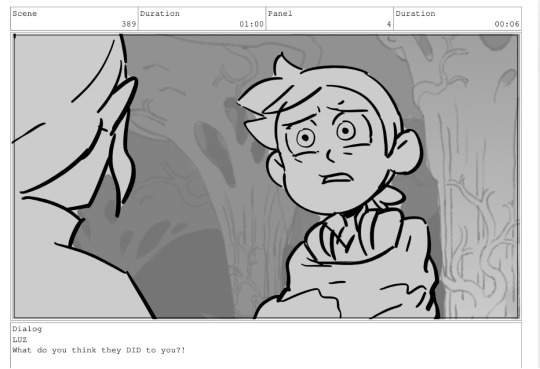
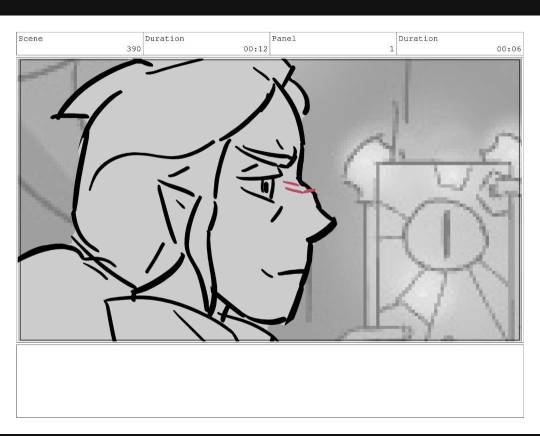
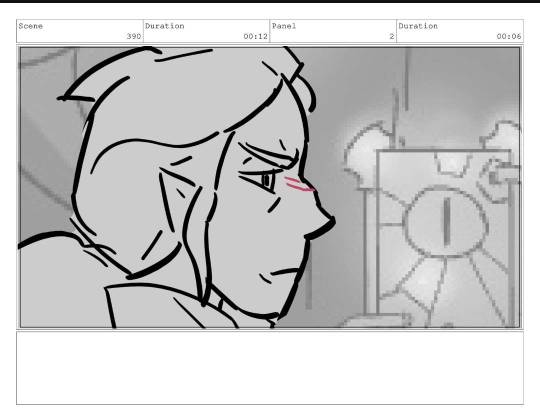
Luz still calls him out for trying to destroy the isles and being a hypocrite but there's still that moment of empathy in which she asks point blank: "What do you think they DID to you?!" She briefly contemplates just why someone would go so far to destroy an entire population and what his mindset might be. Unfortunately, this was not included in the final version and Belos' expression is blank instead of pleading.
Then there's this storyboard from For the Future in which Luz, Eda, and King explain to the Collector how people like Amity and Lilith became their friends:
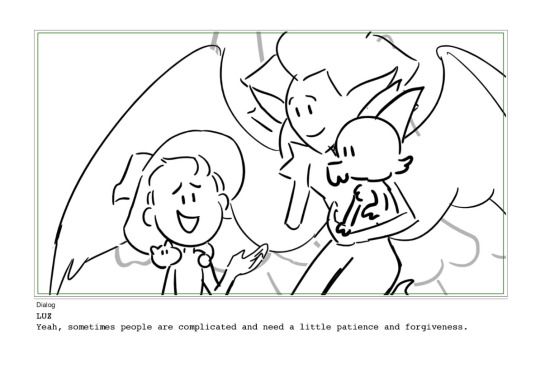

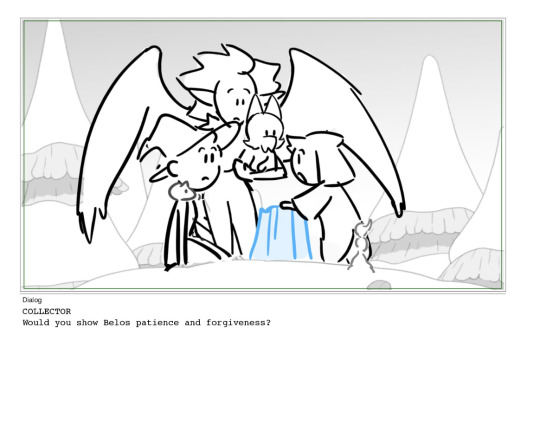
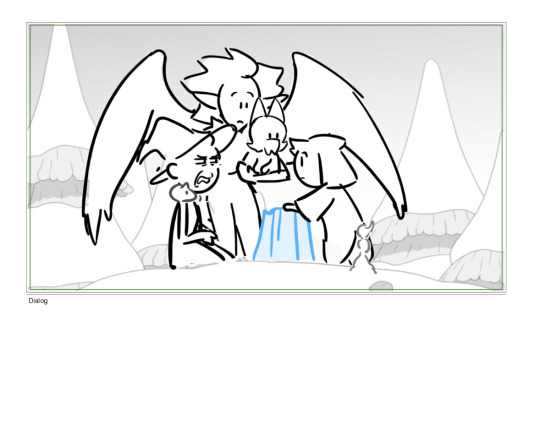
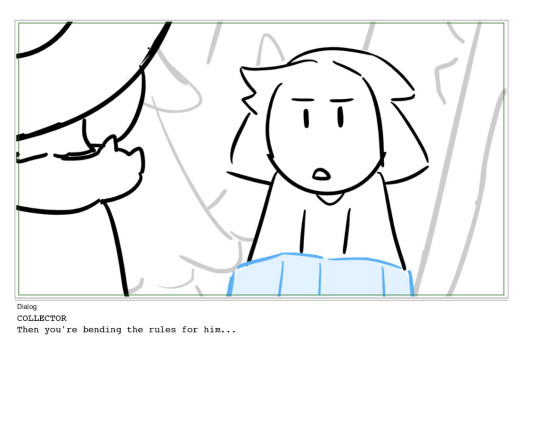

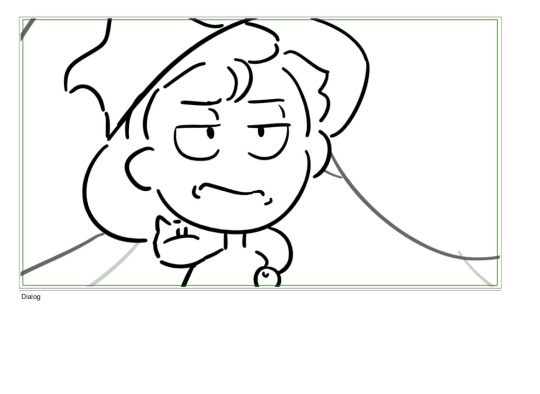
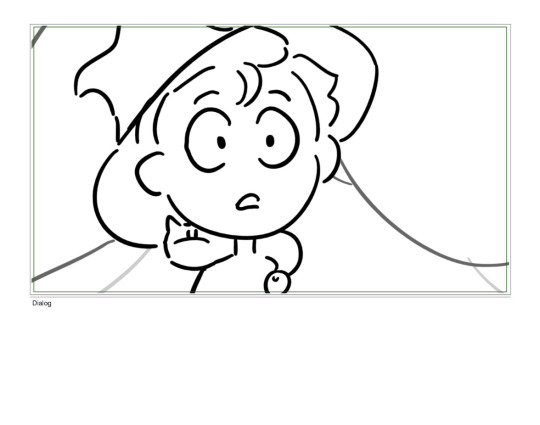

Luz's line about "people being complicated" is in the episode but the entire exchange between her and the Collector is not even though it opens up a lot of interesting ideas and themes. Without it though, the show becomes straight up hypocritical when it states that people are complicated but reduces its villains to generic archetypes and its hero characters as being simply misguided or victims of the villains.
And no, this doesn't mean that the show should have excused Belos' actions or even forgiven him; but they could have and should have acknowledged the complexity of his character by keeping this nuance in and how the characters react to it. By doing so, the message of "people are complicated" becomes clear and strengthens the other characters as well. Luz gets to self-reflect on how she sees other people and learn that even the worst people among us are incredibly complex and have driving forces that are uncomfortably close to our own, thus making it much harder to demonize them. The Collector--instead of being a Giant Star Baby--keeps both his childlike bluntness and keen observational skills that he had in season 2, thus fleshing out the character instead of devolving him.
Regrettably, that nuance is absent from the show and we have a rather black-and-white narrative about Good vs. Evil; people are only ever really "bad" if someone tricked them or if there was a misunderstanding and all the Real Bad People are just selfish jerks who are power hungry and controlling.
This is not compelling storytelling; this is a tale as old as time. And the worst part is that there was a great story in The Owl House but it was left in the rough drafts.
Storyboards by Yasmin Khudari and King Pecora
#asks#toh critical#toh criticism#belosfanstakeover#the owl house#emperor belos#philip wittebane#luz noceda#toh collector#long post#toh meta#toh storyboards
495 notes
·
View notes
Text
Now, we all know about the Wittebane brothers statue in Gravesfield
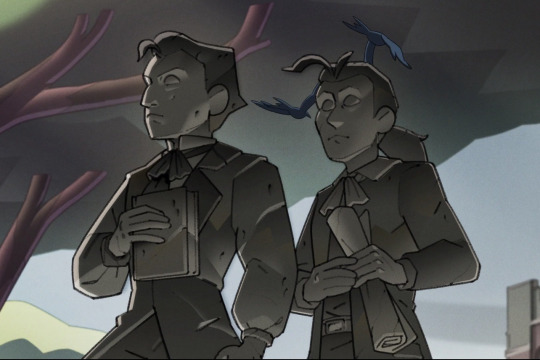
But rewatching the episode a couple days ago, I found out something:
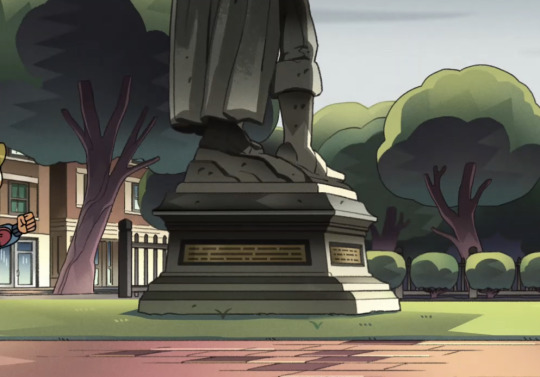
PHILIP IS SHORT
#either the person who made the statue was like ‘well we gotta make them the same height or it’ll look stupid’#or Philip specifically told the person who made the statue to make him not look short compared to Caleb#toh#toh meta#the owl house#the owl house meta#the owl house memes#toh memes#philip wittebane#the owl house philip#emperor belos#caleb wittebane#hunter toh#hunter wittebane
3K notes
·
View notes
Text
Belos's use of fake personas is an interesting part of his character and I want to talk about it for a second. Belos as a persona is the feared but benevolent dictator grandpa who's religious but ultimately caring, and he takes Hunter under his wing after their family dies. This is his Boiling Isles persona, it's not who he really is. He makes deliberate choices to portray himself in this way, specifically giving Hunter the company line about how he would be dead without Belos, etc. The Curse is an extension of Belos he uses to explain why he abuses Hunter. He mainly uses The Curse to get away with harmful actions, ei trying to convince Luz that the Curse made him hurt people.
And then there's Philip as a persona, closer to the real personality of this guy but Philip is trying his best to be a wet cat. He pulls this one out when he needs to be a poor little meow meow about things and has his fake limp that goes along with this one. An extension of Philip is Kid Belos, which is pretty much the same but he's appearing as an innocent kid to try to get Luz to feel bad for him. which is. horrific.
Then there's actual Philip/Belos, who is behind all of these actions and doesn't feel bad about it. He feels like he has a greater purpose and he wants to wipe out an entire island of people because he's a religious extremist, and he attempted to kill his brother's partner, and killed his brother, because he hates people who are different from him. Hunter has always known the Belos persona, and is fully aware of how Belos uses fake personas to get away with shit with The Curse, so the use of names via Hunter and Luz is interesting. Luz struggles with what name she's going to call him because Belos specifically asks her to call him Philip, but Hunter reaffirms calling him Belos because it's mostly a power play and an attempt at separating himself from his actions to call himself Philip.
#the owl house#toh#toh spoilers#toh meta#i know the pathetic personality is fake but it's kinda pathetic to put on a pathetic personality to get away with shit#philip really tried that shit with Luz like she hadn't fully identified that he has these fake personas#because out of anyone Luz is gonna understand that the best as Hunter's friend#who has definitely talked about it and identified it#and Luz who can see it herself anyway#long post
209 notes
·
View notes
Text
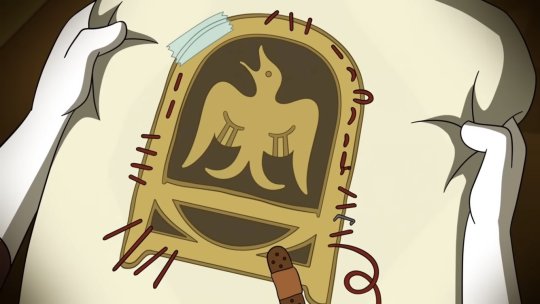


Glad to see Hunter has been practicing his sewing. Darius would be proud,,, 😭
12K notes
·
View notes
Text
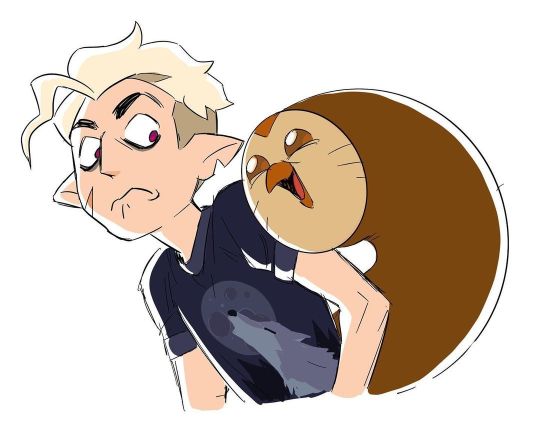

Something tells me Dana LOVES foreshadowing in her art....
#dana terrace has my heart in her hands#dana terrace#toh#the owl house#thanks to them#promo art#season 3#s3#toh hunter#hunter noceda#hunter wittebane#toh spoilers#the owl house spoilers#toh meta#meta#the owl house meta#my own meta
4K notes
·
View notes
Text

LISTEN I actually really hope that this is more than a manifestation or hallucination bc that would hold so much potential for a side of Caleb that I haven’t seen explored in much fan content.
I most often see Caleb depicted by fans in contexts similar to this one as a weary yet ever-enduring saint. An all-forgiving paragon. & certain frames during this scene certainly bring that image to mind (the knife turned to look like a cross, for example).
But in the image above? Caleb’s face certainly looks worn, but there’s more in his expression. He’s disgusted. He’s angry.
That is a look that is so LOUD while Caleb himself is completely silent.
“You stole me. You stole me from my wife and unborn child. You stole me from the grave they gave me. You stole me from the life I should’ve had with the family I built for myself. A family I would’ve welcomed you into had you not chosen hatred.
“You stole from my wife her husband and from my child their father. You tried to steal their lives and when you couldn’t, you stole instead the lives of countless innocent witches and palisman.
“And those boys you made from my stolen corpse? You hardly gave them life, you gave them subjugation. Yet you managed to steal life from them anyhow, killing them before they even had a chance at true living.
“And all this thievery, this murder, in the vain hope that it will equal repentance for killing me. Philip. Maybe these are Satan’s creatures, maybe you are doing God’s work, maybe for this God will forgive you. But I. Never. Will.”
#the owl house spoilers#for the future spoilers#the owl house#toh#caleb wittebane#philip wittebane#emperor belos#for the future#toh meta#toh speculation#500
904 notes
·
View notes
Text
sitting here full on weeping on a friday afternoon because oh my god it's just all about grief in the owl house isn't it. all of it. it's all about the love that's left behind and who we choose to become with it.
i just. god. jesus fucking christ it's about how the world quite literally starts and would end in the loss of a father; it's about how the world was created by the titan leaving his son behind. it's about how the world nearly ended by caleb dying before meeting the child he was expecting. it's about how the world was saved by the last gift luz's father left her. it's about how we have the choice to move forward in spite of the loss or stay trapped behind, to accept and open your heart to new love or to deny and twist their memory into something grotesque. it's about how nothing within the plot of the owl house would even exist had three men not died, had three fathers not been forced to leave their children behind. are you listening look me in the eyes.
i'm a wreck in here like. in the end isn't it all about love. isn't it all about loss. in the end aren't they one in the same. i need to lie down
#ik this came out of nowhere it's Been A Day (i swear im fine though hgskghs /gen)#toh#the owl house#toh meta#ev.post#i feel like there's more i should say on this but i've mostly just been. internally screaming all day. Ough The Themes And Narratives
967 notes
·
View notes
Text
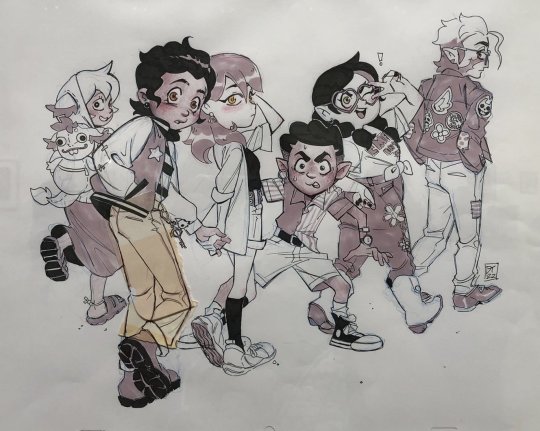
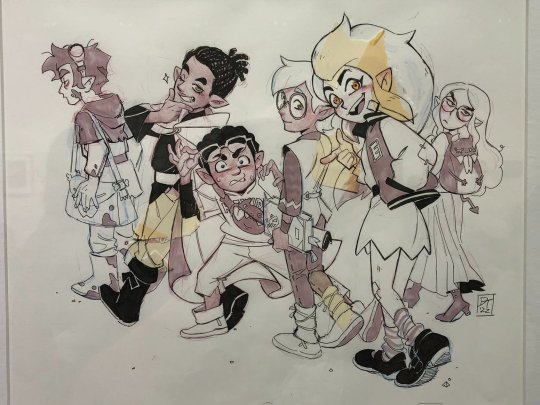
some observations from the new art, in no particular order and of varying importance:
-eda and luz wearing the exact same jacket, which is adorable
-vee's lil basilisk backpack, also pretty cute (and lilith also having a silly demon backpack. also perry's lil fanny pack. is alador's bag also a creature?)
-lilith looking grouchy while vee looks cheerful and hunter looks back at his group while alador looks completely disconnected. and luz looks a liiittle less confident than eda. but the rest of them have similar expresssions to the character they're paralleling
-darius's cloak looking closer to the golden guard cloak or perhaps just the emperor's coven cloaks than to his current one
-luz's portal key and king keychain
-the patches on hunter's jacket!!! bad girl coven quitter badge! flower matching willow! king/titan head! wing (for flapjack?)! and is that the abomination symbol (dadrius crumbs! or alador parallel but i'm gonna say dadrius crumbs)
-hunter's scar and the abomination sludge on alador's face being in the exact same place. also them both having really bad eye bags. possibly a parallel between hunter being abused by belos and alador being abused by odalia??? but that's pretty loose considering they appear to still be at hexside and odalia probably didn't start abusing alador til later. also alador seems the type to be messy and have a bad sleep schedule on his own, before the abuse exacerbated it
-speaking of which, everyone else has their own clothes but alador is in an extremely raggedy hexside uniform?
-the hexsquad all wearing human clothes, while the older group has more witchy clothes, except for perry
-willow in an emerald entrails t shirt!
-amity's dangly earring looks a lot like raine's usual earring (which is not visible here bc it's on their right ear). also raine and gus both have only their right ear pierced (The Gay Ear, supposedly, lmao)
-hunter's sunglasses (or glasses?) paralleling alador's goggles
-willow's heart shaped glasses. adorable.
#eliot posts#toh#the owl house#toh meta#gallery nucleus#hunter toh#alador blight#willow park#darius deamonne#perry porter#amity blight#raine whispers#luz noceda#eda clawthorne#vee noceda#lilith clawthorne#abuse mention#long post#gus porter
2K notes
·
View notes